|
Innocence is precious. Childhood is sacred
By Nandini Stocker
medium.com
September 03, 2017
https://medium.com/@stocker/innocence-is-precious-childhood-is-sacred-76053c8c64e6
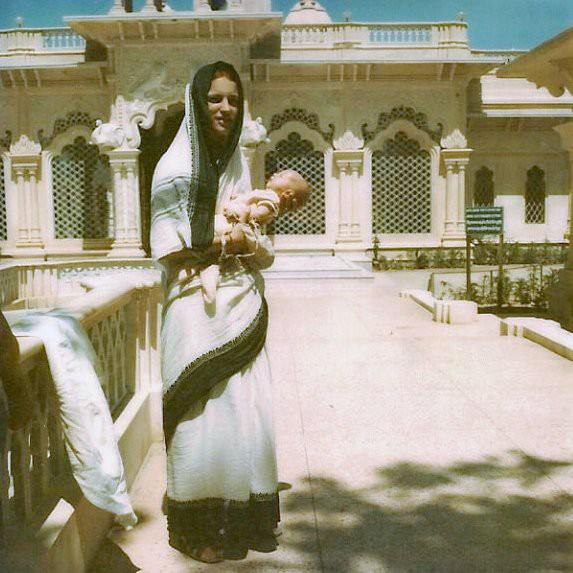 |
| My mother, Hrimati, is holding me just a few days old in front of Krishna Balaram Mandir in Vrindavan, Uttar Pradesh |
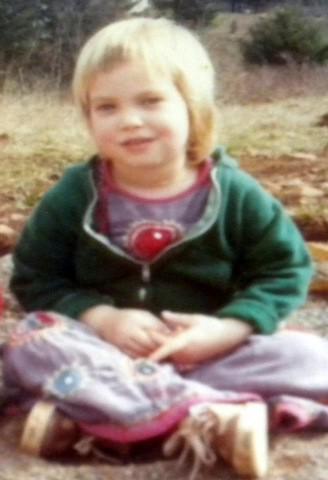 |
| I spent much of my childhood traveling around the world with my parents or sent away to live in ashram communities or with other members of ISKCON. Here I’m about 4 years old where I lived with a sort of foster family that adopted me for a while. I would be reunited with my mother not long after this photo. |
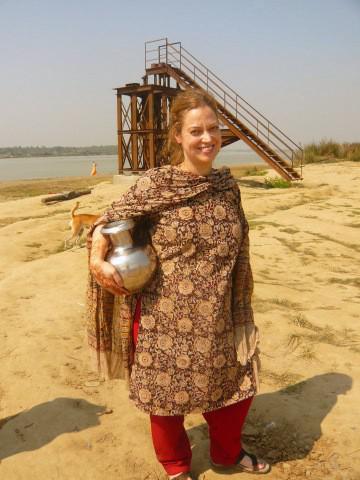 |
| In 2012 I finally returned to India to attend my brother’s wedding in the Nadia District of West Bengal where my mother lives and advocates for the ethical care of temple elephants. Returning there was an important part of healing after writing this original piece in 2011. |
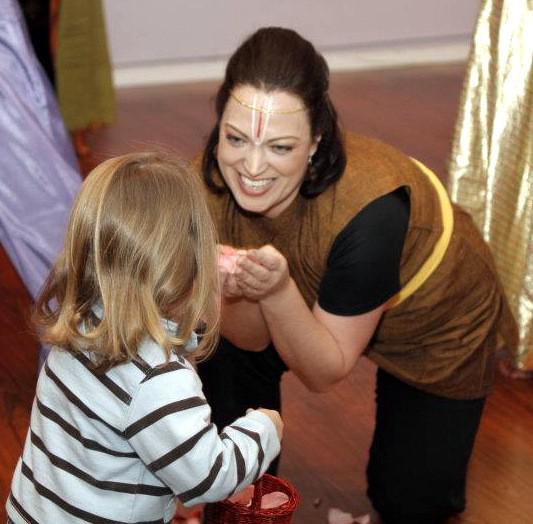 |
| I still find joy in the music and culture of India, particularly when observing the world through the eyes of my children. Here I had just performed a yoga dance interpretation of the Ramayan, playing both the roles of Lakshman and Jatayu the Vulture King. Afterward my daughter brought rose petals to me and the others at the event. |
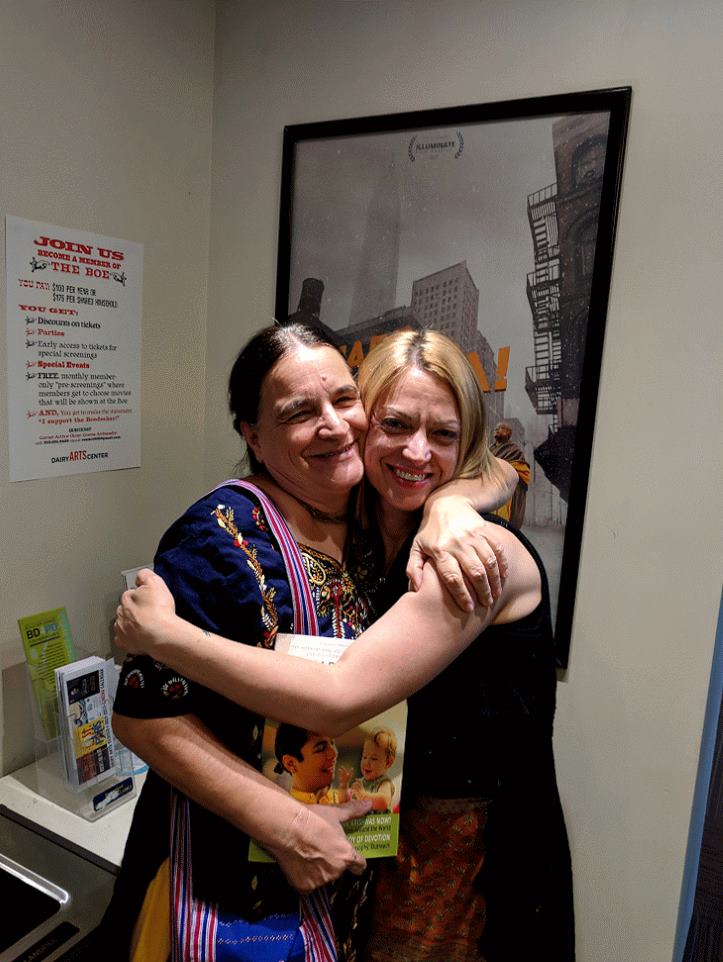 |
| In July of 2017 my mother and I attended a showing of “Hare Krishna! The Mantra, the Movement and the Swami Who Started It” in Boulder, CO. The film tells the story of the beginning and some of the issues ISKCON has faced, but has a glaring omission about the lost generation and abuse scandal. That’s ok…for now. Seeing it together served to give us closure and true healing. Now that has freed us to create a new beginning. |
[An auspicious birth. An epiphany from my inner voice.]
I was born into the International Society of Krishna Consciousness (ISKCON), otherwise known as the “Hare Krishna Movement”. In fact, I was even born on the “appearance day” (i.e. birthday) of its founder, in the same village in India where its primary deity, Krishna, is said to have been born on Earth some 5,000 years ago.
Despite my “auspicious birth”, I don’t consider myself an expert of this religion by any definition and have never quite felt like I belonged. Unlike so many others who grew up in the Movement, I can’t recite ślokas on demand, quote the Bhagavad Gita perfectly, or properly explain the main tenets of its creed. I don’t even follow all of its four main guiding principles. Except for being a lifelong vegetarian. Mostly. I have stuff that contains eggs once in a while. And I’m not a big gambler. But I have had “illicit sex” during my lifetime and do enjoy the occasional alcoholic beverage.
An uncomfortable truth.
In my teens and 20’s I was embarrassed to say I was a “Hare Krishna,” for all the same reasons it is ridiculed so readily in pop culture. If you don’t know what I’m talking about, each of these words is an example. I still cringe a little bit when I hear the words — which pop up everywhere by the way. It was in a question on Jeopardy. There’s a Pictionary clue about it. You can buy a Hare Krishna Halloween costume. Or a Hare Krishna Zombie action figure. Wait, that last one is kinda awesome.
For most of my life I could never figure out why it made me so uncomfortable. There were a few years when this turned into a kind of identity crisis. Let me explain something for a minute to illustrate how this has played out for me and then I’ll get back on track. You see, I couldn’t get away from it.
It all starts with my name. I would meet someone. They couldn’t pronounce my name. I would explain how to say it. They would comment and ask, “What a beautiful name, where’s it from?” I’ve tried various pat answers, each with a goal of ending the conversation as quickly as possible. “It’s Indian” — which sometimes garners the dreaded “What tribe?” response. Real Indians give me mixed responses. It’s either a double-take — “But that’s an Indian name!” (as if I’ve violated some racial norm), or it prompts a big gracious smile and then a welcoming, you’re-one-of-us type of air takes over the interaction. An “I was born in India” usually helps too. “It’s a long story” never works. Usually the response is along the lines of “Oh, did you make that up?” Probably the worst experience was when I was 15 and called into a radio station contest. The DJ joked — on the air — to my poor teenage self’s utter mortification: “Did your mom have a little too much to drink when she gave you that name?” For a few years I tried going by fake names when asked by strangers and asked friends and colleagues to “just call me Nan”. Eventually that had the reverse effect of hurting my sense of identity even more, so I took back my real name.
So, as I hope you can imagine, if I had that much stress with just my name, it got really hard when it came to figuring out where I fit in the world with things like spirituality and finding real purpose and meaning in my existence.
By the way, if you want to know the real story, my name was given to me by, again, the founder of ISKCON, Srila Prabhupada. Nandini is Sanskrit, and translates to something like “treasured daughter”. When I was placed on his lap, he reportedly didn’t hesitate and proclaimed my name “Nandini!” and then explained that it was the perfect name for me, considering I was born on Nandottsava, the day after Krishna’s birth when His father Nanda held a big celebration. So there again, being named by Prabhupada was considered another very special rite in this so-called religion that I was born into.
I’ve spent my whole life trying to figure out why being associated with my religion of birth makes me queasy. I’ve realized it is indubitably part of my identity, so I can’t ignore it.
Identity is formed, or at least initially molded, in childhood.
Mind you, I don’t have only negative memories or impressions from growing up in the Movement. I traveled all over the world, so the globe seems a whole lot smaller to me than to some. I have an affinity for understanding Eastern cultural icons. I love the music, the food, and many more elements — either because they appeal to me inherently or perhaps it’s out of nostalgia.
In any case, despite all those things, I still cringed for most of my life at the mention of “Hare Krishnas” and was mortified if anyone would know that’s how I grew up. But finally one day it clicked: I didn’t identify, and indeed, had an aversion to the Movement because it stole my childhood. Despite my birthplace, my name, and all that auspiciousness, my childhood was not a special one. It was full of trauma, abandonment, and abuse.
And I’m not unique. This is not my sob story.
I actually have some monumentally hopeful things to say, so stick with me.
Almost every person in my generation of the Movement suffered some sort of abuse. It got better later — some of my younger brothers have had wonderful, wholesome experiences. Yet, it’s still happening. As is the case with child abuse — it can become an ugly cycle of the abused sometimes becoming abusers themselves, often at a young age before ever learning right from wrong. Others in my generation have lived out their lives in other tragic ways. Depression. Alcoholism. Drug abuse. Prostitution. Living on the streets. Mental institutions. And, as I’m sure you might guess, suicide. Probably the least of the effects (although some devotees say it’s the worst) has been a complete loss of faith and rejection of everything spiritual that ISKCON is supposed to stand for.
ISKCON lost its way after its founder passed away in 1977, although it was possibly doomed from the start. It tumbled into a spiral of corruption, greed, and criminal behavior. And that only describes what happened to the people in charge. ISKCON was and is governed by humans after all. And as thousands years of history have proven, problems arise in all societies, small or large, due to human flaws. And this was a small society, truly segregated from larger civilized culture. In fact, the outside world was reviled and painted as the enemy to keep people locked in. Our parents’ counter-culture ideals got lost somewhere along the way in the very institutionalized, authoritarian environment they so despised in their youth. It has only been in recent months that I’ve finally settled on an assessment of the group as a whole. It was a cult, just like everyone said it was, complete with brainwashing and group think.
There is really nothing else to explain the greatest tragedy of ISKCON — what happened to an entire generation of its children. And that’s where I would like to focus. Like the Catholic Church and many other religious groups, ISKCON has suffered from scandal and missteps in managing cases of child abuse. A large group of kids that grew up in my generation and went through the worst of it collectively filed and won a lawsuit against the leaders of ISKCON in 2000. For the kids who either entered the movement with their parents at a young age or were born into the movement in the 70’s and early 80’s, being in the Movement involved every range of abuse. Most kids were enrolled in gurukula ashrams (think parochial boarding schools), hundreds or even thousands of miles from their parents. These schools varied greatly in how stark or miserable they were. Some were just austere but full of fun and adventure, while others were like prisons, in every sense of the word. Children were often deprived of nutritional meals, beaten, molested, “disciplined” with brutal punishments, and for some, things were much, much worse. And by children I mean some as young as 3, but the standard age kids were sent away began at 5.
In general, throughout the Movement, like women, children were treated as third-class citizens. In the artificial class system that was created within the cult, the single, celibate male was revered as the most important while families were not supported in a way for them to be successful as important units where children could thrive. Instead, children were removed from the family unit and put in these ashrams to be cultivated into the next generation of devotees. But the cultivation was perplexing. Kids got such mixed messages. On the one hand they were told they were fortunate to be born into the Movement, as if they were somehow the Chosen Ones. On the other hand, they were inundated with language that was harmful at worst, ridiculous at best, and never age appropriate. For example, girls as young as 4 or 5 were castigated for wearing a ponytail instead of a braid — told they were “agitating the men”. The same went for girls of any age wearing a part in their hair — that meant they were “dressing like a prostitute”. The list goes on.
Although all kids suffered some form of neglect, abandonment, or physical and sexual abuse, the boys had it worst in the brutality department. And for girls, things would not let up even as they grew older. Some girls as young as 12 were married off to grown men, in what could only be described as a human trafficking scheme.
Something I’ve always sought when reading about the abuse scandals in other religious organizations is an answer to: why? What is it that makes abuse so rampant at the hands of priests or authority figures in the Catholic Church? Is it the celibacy? Because that’s one thing Catholicism shares with the Hare Krishnas — sexual repression. Is it that priests have the power to absolve people of their sins? Maybe they have a bloated sense of power that they can excuse their own actions. In a way, that is another thing they have in common with the Hare Krishnas. Devotees believe in karma, yes, but they also put an irrational weight on chanting certain mantras to absolve oneself of sins. So, false piety? Could that be it? Ultimately I don’t know why the perpetration of sexual abuse exists historically in the Catholic Church. And I’ve given up trying to figure it out (I’ll leave that to some very capable people fighting that fight). Maybe it’s simply evil, human flaw, whatever.
But what I really do not understand, is how an entire generation of children were mistreated in the Hare Krishna Movement.
How does that happen when *this* is your God:
Krishna. The all beautiful. The innocent, beautiful baby and young boy, whose pastimes are celebrated by millions. And not a perfectly behaved boy, mind you. A naughty troublemaker that tested the patience of his mother. He got into stuff. He stole food. He ran off all day to have fun with his friends in the woods. Played tricks on people. Teased the village girls. Yet, Krishna was the object of pure love and devotion by all those around him.
To this day He is worshipped as this form. Revered as this form. A child.
It makes me wonder if perhaps a group that calls themselves the International Society of “Krishna Consciousness” seems to have monumentally missed the mark. Just imagine, for a moment, if being “Krishna Conscious” meant being conscious of how Krishna might be connected to the hearts of people around us.
The children around us.
Imagine for a moment what it would mean if we looked at children as a direct connection to God.
Let me explain. If you know a child, have a child, or even simply look back to when you were a child yourself, stop and think for a second about the wondrous way that children approach the world around them. While we as adults might be absentmindedly occupied in our thoughts, pondering some bill we have to pay or what’s stressing us out at work, the child next to us proclaims “a bird!” with exuberance, follows an ant’s progress across the sidewalk, or steps on a leaf and becomes fascinated with the sound and texture of it.
What if children are actually connecting us to the beauty of the world, to Creation, to the Universe, whoever that Entity may be. It’s as if She is saying to us,
“Look! Everything you need to know about how to live and love in this world is right in front of you, showing you, teaching you. But hurry, it’s fleeting! Notice it. Cherish it. Protect it. Make it last, because it will fade or become dormant once innocence is lost.”
Innocence.
It’s what only children possess. It’s what makes their world worth protecting.
There is wisdom in innocence.
Think of all we can learn if we just stop and observe what they teach us just by being who they are:
Children are curious.
Children live in the moment.
Children are resilient.
Children feel every emotion absolutely.
Children are honest.
Children love unconditionally.
Indeed, it is by observing all these qualities in my own children that I feel truly that they have brought me closer to God. It is my own children that gave me this epiphany through my inner voice, about how, just maybe, actual Krishna Consciousness was possible — how ISKCON got it tragically wrong, but still offers a silver lining — maybe it is a gift to have been introduced to God as a sweet child, celebrated and worshipped.
After pondering this concept for through exploration of this epiphany, I have come to truly believe this one truth:
There is nothing in life that you can’t tie back to the importance of childhood, of innocence, and honoring and protecting both.
It’s not just a concept for parents to embrace. And this isn’t a new concept either. Although the phrases have become clichéd — “It takes a village to raise a child,” “the children are our future”, and so on — it really is true.
When I reflect back on ISKCON, I lament over the experiences of my generation of worldwide brothers and sisters that grew up in the Movement during those first 20 years. It troubles me to no end that, in a way, we were a lost generation. Opportunity squandered. Just imagine what ISKCON would be today if the focus had been on families and children — protecting, nurturing and empowering them to be the backbone of the Movement. Instead, it’s now a shadow of what it could have been. Most of us survived, and many of us have even done quite well finding our way in the world. But many others have not. And regardless of the level of healing we have each undergone, all of us have struggled with our identities, our past, our confusion about where we fit in the world.
Yeah, so just imagine.
Claiming redemption for the lost generation.
My husband, my brothers, and many friends have expressed out loud our commitment to break the cycle of whatever abuse was passed down to us. It stops here. Now. With our generation. It is our collective responsibility to protect the rite of childhood.
Innocence is precious.
Childhood is sacred.
When I originally wrote this piece in 2011, I had not yet fully healed my relationship with my mother. I suppose for the longest time some part of me couldn’t fathom how she could have “let” us go through what we did. I grew to learn through empathy as a mother myself however, that she did what she thought was the best for me under the circumstances at the time. Always.
Just as my childhood was stolen, she sacrificed her motherhood.
It was only when I started speaking my own truth authentically in all things (including professionally) that I really explored and embraced my mother for the pure heart she has, full of love for me and my brothers.
So, just as my generation has committed to stopping the cycle of abuse, my parents have also joined an upswell of voices calling justice for children’s innocence. For preserving what’s truly sacred. And claiming redemption for the lost generation.
So I’m going to leave it there for now. There is much more to say and to share of my truth. Thank you for taking the time to hear what’s in my heart.
|




